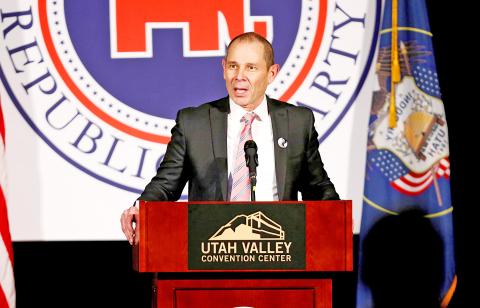US representatives on Friday introduced their Taiwan Allies International Protection and Enhancement Initiative (TAIPEI) Act to reinforce ties with Taiwan.
John Curtis, a Republican US representative as well as a member of the US House of Representatives Foreign Affairs Subcommittee on Asia, the Pacific and Nonproliferation, worked with four colleagues in the House to initiate the bill.
The four other representatives are Michael McCaul, the lead Republican on the subcommittee and chairman emeritus of the Homeland Security Committee; Mario Diaz-Balart, the Republican cochair of the US Congressional Taiwan Caucus; Albio Sires, the Democratic cochair of the caucus; and Vicente Gonzalez, a Democratic representative.

Photo: Reuters
“The bipartisan legislation is intended to strengthen Taiwan’s standing around the world and comes in response to increased Chinese pressure intended to restrict Taiwan’s international space and global diplomatic recognition,” Curtis said in a statement.
The move came after the US Senate Committee on Foreign Relations passed its own version of the act on Sept. 25.
Both versions, which are similar, say that the US government should support Taiwan to strengthen its relationships with its diplomatic allies and unofficial partnerships with countries in the Indo-Pacific region and around the world.
In alignment with its interests, the US government should consider reducing its economic, security and diplomatic engagement with countries that take serious or significant actions to undermine Taiwan, both say.
They urge Washington to launch negotiations with Taiwan “with the goal of entering into a free-trade agreement that is of mutual economic benefit and that protects United States workers and benefits United States exporters.”
The Senate and the House need to pass a single bill before it can be presented to US President Donald Trump to sign into law.
On his Web site, Curtis posted a video in which he said he was delighted to help Taiwanese, even though he left the country he loves many years ago.
“My time as a missionary for the Church of Jesus Christ of Latter-day Saints in Taiwan provided a unique understanding of the history and culture in the region. Almost four decades later, I am still committed to advocating on behalf of Taiwan and the Taiwanese people,” he said.
“Our relationship with Taiwan is an important alliance and we must do all we can to empower their democracy and free-market economy,” he said. “The TAIPEI Act is bipartisan, doesn’t cost the American taxpayer a cent and it combats Chinese bullying tactics. Win, win, win.”

UKRAINE, NVIDIA: The US leader said the subject of Russia’s war had come up ‘very strongly,’ while Jenson Huang was hoping that the conversation was good Chinese President Xi Jinping (習近平) and US President Donald Trump had differing takes following their meeting in Busan, South Korea, yesterday. Xi said that the two sides should complete follow-up work as soon as possible to deliver tangible results that would provide “peace of mind” to China, the US and the rest of the world, while Trump hailed the “great success” of the talks. The two discussed trade, including a deal to reduce tariffs slapped on China for its role in the fentanyl trade, as well as cooperation in ending the war in Ukraine, among other issues, but they did not mention

Japanese Prime Minister Sanae Takaichi yesterday lavished US President Donald Trump with praise and vows of a “golden age” of ties on his visit to Tokyo, before inking a deal with Washington aimed at securing critical minerals. Takaichi — Japan’s first female prime minister — pulled out all the stops for Trump in her opening test on the international stage and even announced that she would nominate him for a Nobel Peace Prize, the White House said. Trump has become increasingly focused on the Nobel since his return to power in January and claims to have ended several conflicts around the world,

GLOBAL PROJECT: Underseas cables ‘are the nervous system of democratic connectivity,’ which is under stress, Member of the European Parliament Rihards Kols said The government yesterday launched an initiative to promote global cooperation on improved security of undersea cables, following reported disruptions of such cables near Taiwan and around the world. The Management Initiative on International Undersea Cables aims to “bring together stakeholders, align standards, promote best practices and turn shared concerns into beneficial cooperation,” Minister of Foreign Affairs Lin Chia-lung (林佳龍) said at a seminar in Taipei. The project would be known as “RISK,” an acronym for risk mitigation, information sharing, systemic reform and knowledge building, he said at the seminar, titled “Taiwan-Europe Subsea Cable Security Cooperation Forum.” Taiwan sits at a vital junction on

LONG-HELD POSITION: Washington has repeatedly and clearly reiterated its support for Taiwan and its long-term policy, the Ministry of Foreign Affairs said US Secretary of State Marco Rubio yesterday said that Taiwan should not be concerned about being used as a bargaining chip in the ongoing US-China trade talks. “I don’t think you’re going to see some trade deal where, if what people are worried about is, we’re going to get some trade deal or we’re going to get favorable treatment on trade in exchange for walking away from Taiwan,” Rubio told reporters aboard his airplane traveling between Israel and Qatar en route to Asia. “No one is contemplating that,” Reuters quoted Rubio as saying. A US Treasury spokesman yesterday told reporters